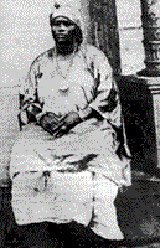Мадам Йоко

Queen Madam Yoko of Kpaa Mende and Seneghum, (Sierra Leone) Known as Mammy Yoko, she was a brilliant and ambitious woman who used her friendship with the British to gain control of Kpaa Mende. As a child, she was called Soma but acquired the name Yoko at her Sande initiation where she attracted admiration for her beauty and graceful dancing. After an unsuccessful first marriage, Yoko became the wife of Gbenjei, Chief of Taiama; and although she was barren, Gbenjei made Yoko his head wife. When Gbenjei died, Yoko married Gbanya Lango, a powerful war-chief at Senehun.
In 1875, she saved her husband from a long imprisonment under the British by making a personal appeal to the Governor, who was charmed by her beauty and feminine graces. Afterwards, Gbanya used Yoko in diplomatic missions to the British and to other chiefs. After the deaths of Gbanya she became the "Queen of Senehun". Within a few years, she had brought all of the Kpaa Mende region (now fourteen chiefdoms) under her nominal control through alliances, warfare, and her ability to call on the support of friendly British troops. She established a famous Sande bush in Senehun where she trained girls from throughout Kpaa Mende, sometimes giving the most beautiful in marriage to sergeants of the Frontier Police or to important chiefs. When the British declared their Protectorate in 1898, Madam Yoko commanded her people to pay the new tax — but her sub-chiefs rebelled. They held a secret meeting, blaming Yoko for "spoiling the country" by supporting the British police, taxes, and forced labour. Yoko took refuge in the police barracks which withstood several attacks by her own subjects, and she was later awarded a silver medal for her loyalty by Queen Victoria. Madam Yoko ruled as a Paramount Chief in the new British Protectorate until 1906, when it appears that she committed suicide at the age of fifty-five. If true, her reasons have never been altogether clear.
A British official wrote that she had obtained all there was to be had in life — love, fame, wealth, and power — and felt there was nothing more to look forward to. But her attempts to manipulate the British for her own ends had turned around on her. She had lost the support of her people, and perhaps she was bored and saw nothing challenging in Britain's new and tightly controlled protectorate. She lived (ca. 1849-1908).
In 1875, she saved her husband from a long imprisonment under the British by making a personal appeal to the Governor, who was charmed by her beauty and feminine graces. Afterwards, Gbanya used Yoko in diplomatic missions to the British and to other chiefs. After the deaths of Gbanya she became the "Queen of Senehun". Within a few years, she had brought all of the Kpaa Mende region (now fourteen chiefdoms) under her nominal control through alliances, warfare, and her ability to call on the support of friendly British troops. She established a famous Sande bush in Senehun where she trained girls from throughout Kpaa Mende, sometimes giving the most beautiful in marriage to sergeants of the Frontier Police or to important chiefs. When the British declared their Protectorate in 1898, Madam Yoko commanded her people to pay the new tax — but her sub-chiefs rebelled. They held a secret meeting, blaming Yoko for "spoiling the country" by supporting the British police, taxes, and forced labour. Yoko took refuge in the police barracks which withstood several attacks by her own subjects, and she was later awarded a silver medal for her loyalty by Queen Victoria. Madam Yoko ruled as a Paramount Chief in the new British Protectorate until 1906, when it appears that she committed suicide at the age of fifty-five. If true, her reasons have never been altogether clear.
A British official wrote that she had obtained all there was to be had in life — love, fame, wealth, and power — and felt there was nothing more to look forward to. But her attempts to manipulate the British for her own ends had turned around on her. She had lost the support of her people, and perhaps she was bored and saw nothing challenging in Britain's new and tightly controlled protectorate. She lived (ca. 1849-1908).